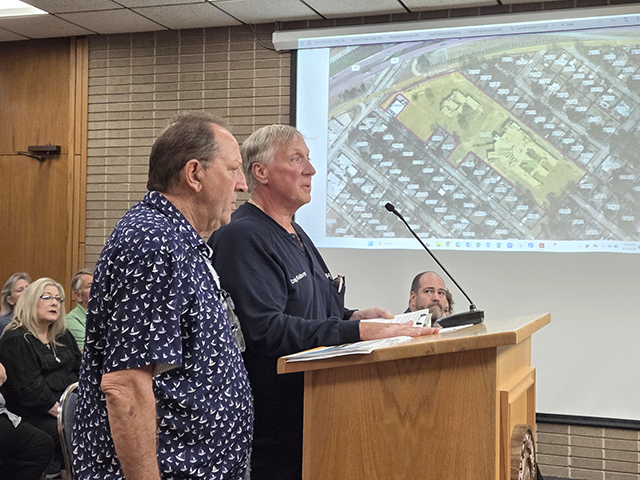Neither rain nor flood stays the course of this nurse
Published 6:40 pm Thursday, October 5, 2017

- Courtesy photo Jana Swearingen (left) and Miranda Zerko smile as they make their way from Lumberton to Beaumont during the Harvey flooding.
By Lorenzo Salinas
Some people look to avoid work whenever possible; Jana Swearingen went to extraordinary measures to ensure she actually made it to work.
After Harvey had rendered most of the streets and highways in Lumberton inaccessible due to flooding, Swearingen and her friend and co-worker Miranda Zerko went not by one, not by two, but by three boats to make it to their place of employment, CHRISTUS Southeast Texas St. Elizabeth Hospital in Beaumont. They are both nurses.
After emergency services and first responders had closed down access to the flooded areas, Swearingen went looking for permission to accompany the people going across the waters in boats.
“I wanted to get on a boat because I had been by the fire station and nobody out there was doing anything,” Swearingen said. “It was just the local people with their boats because it was too dangerous to cross (otherwise).”
Swearingen put out a message on Facebook to find if anyone had contact information with authorities to get permission to make the trip. A friend replied saying she had contact information, and Swearingen and Zerko began their journey.
“We went up and asked for so and so,” Swearingen said. Finally, they found the man to ask.
“He said, ‘OK. It’s your own risk.’ We just went up to someone with their own boat,” she said.
That was the first ferry across standing water. The road to Beaumont was flooded all the way through. Swearingen and Zerko walked the few unflooded parts between boat rides.
“Me and a friend in the neighborhood across from me walked on dry patches of the highway,” Swearingen said. “We didn’t know any of those guys’ names. We just went up to them and asked, ‘Could we hitch a ride on your boat to the next patch of land?’
“They said, ‘Sure. Where you going?’ We said, ‘We’re going to work.’”
Swearingen said the final stretch was particularly arduous: the flooded area was long and the currents were swift.
“The first day we couldn’t make it across,” Swearingen said. “Maybe earlier in the day people could cross, but by that time the current had gotten too swift. They quit letting volunteers go. So, we tried the next day.”
Swearingen and Zerko met with success as one man took them across in his airboat.
“When we got to the other side, I called our boss and asked him if he could pick us up,” she said.
Swearingen’s husband had told her she was hardheaded, but she was determined to go.
“I’m not one to be told no,” she said.
When the two nurses were at work, their boss paraded them around in their rubber boots and plastic pants.
“He was like, ‘Wait, wait…!’ He showed us off. He had to show us off.”
Swearingen said she felt she had to show up because there just weren’t many nurses on staff at the hospital.
“Part of the issue was they were so strapped…” she said. “Why I felt so much pressure to get there was (because) before I got there, I was hearing stories of some nurses who were working well over 12 hours because there were so few people able to get in as relief.
“They were working (from) 7 a.m. well into the night and then just having to trade off to sleep. I knew they needed relief.”
Swearingen said the patient load at St. Elizabeth was roughly the same as it normally was; it was just an issue with resources.
“Water was an issue. We didn’t have running water…” she said. “We weren’t technically rationing anything, but we didn’t know how long we’d be without water.”
Hospital staff made due with what they had and survived the course. Swearingen worked there for three days before being relieved by Tyler nurses who had been flown in as relief.
“Once they got there, we had plenty of staff,” she said.
Swearingen said she didn’t feel she did anything heroic; she just did her job.
“I just went to work. It’s just a fun story because of the boats,” she said.






